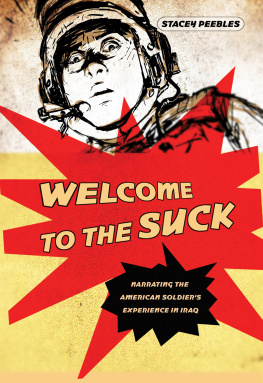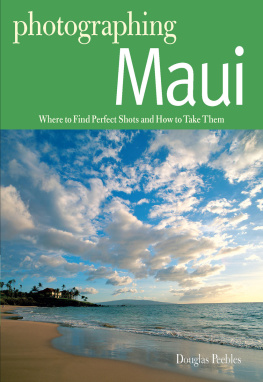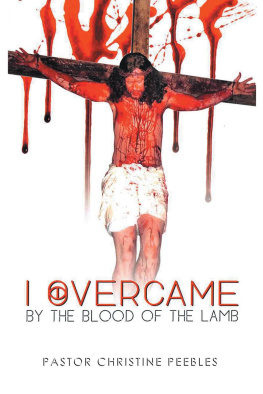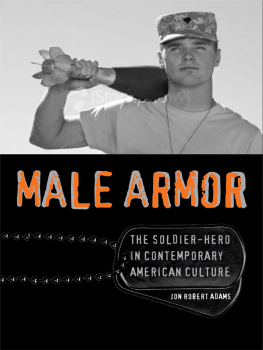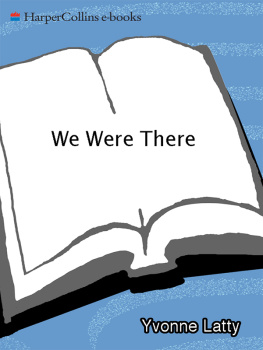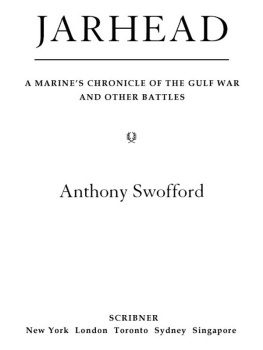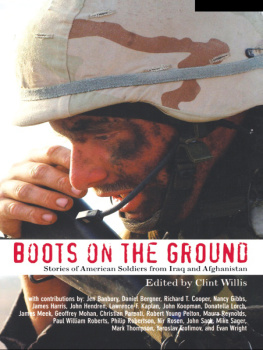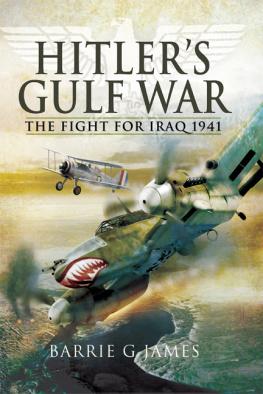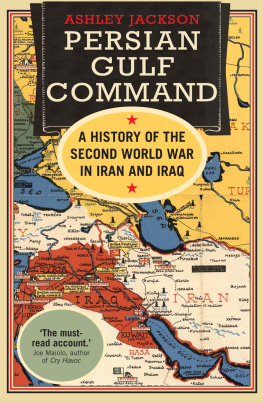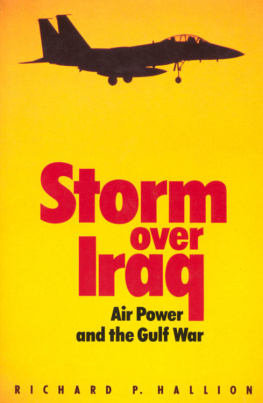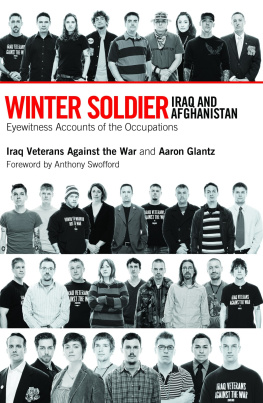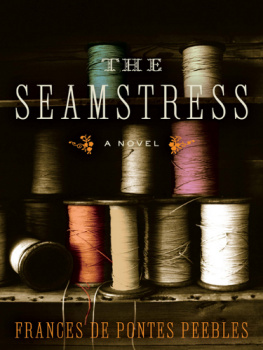LINES OF SIGHT
Watching War in Jarhead and My War: Killing Time in Iraq
War is the worlds second-oldest form of entertainment. From Achilles and Cchulainn to Krishna and the Volsungs of Icelandic saga, our most enduring stories are about war and war heroes, and the post-Neolithic art found on every continent except Antarctica suggests our fascination with the images of battle as well. Getting caught up in the representation of war allows for the vicarious (and safe) enjoyment of its thrilling and troubling spectacle and the chance to take a peek at life and death in extremis. That spectacle can be captivating even for those in the midst of war, where the investment in the deadly goings-on is much more dire. The desire simply to see, politics and morality aside, can be overwhelming. Part of the love of war stems from its being an experience of great intensity, notes Bill Broyles, in his famous essay Why Men Love War. [I]ts lure is the fundamental human passion to witness, to see things, what the Bible calls lust of the eye and the Marines in Vietnam called eye fucking (56). War, after all, can be the show to end all shows. For all its horror, you cant help but gape at the awful majesty of combat, Tim OBrien writes in How to Tell a True War Story. You admire the fluid symmetries of troops on the move, the harmonies of sound and shape and proportion, the great sheets of metal-fire streaming down from a gunship, the illumination rounds, the white phosphorous, the purply orange glow of napalm, the rockets red glare.... Its astonishing. It fills the eye. It commands you. You hate it, yes, but your eyes do not (8081).
Broyles and OBrien frame this passion to witness actual war as an illicit pleasure, unlike, one assumes, reading the Iliad for a college class. As battle rages and real people die, morality would perhaps dictate that you should look away and not desire to see such horrible things. Of course you hate it, says OBrienany normal person could not possibly approve of such pain, suffering, and destructionbut you love watching, too. And so you indulge in visual lust. New soldiers often anticipate this very pleasure, the chance to see things that people arent supposed to see. In decades and centuries past they might have fed their anticipation by listening to the stories of their elders or reading war histories, but since the advent of filmsand more particularly, videosthey have the opportunity to view and re-view representations of what those sights might be like. In two recent memoirs, the former infantrymen Anthony Swofford and Colby Buzzell have portrayed the experience of preparing to fight the Gulf War and the Iraq War while watching films about the Vietnam War with something like the illicit pleasure that Broyles and OBrien describe. Those films are most often thought to be antiwar, and yet instead of reflecting somberly on the carnage at hand, Swofford and Buzzell thrill to the violent and sexy spectacle of fighters like them violating social and moral taboos.
Swofford and Buzzell are indeed enchanted by these films, and ready to be initiated into the theater of war. That initiation, however, occurs differently than they expect. In this chapter, I explore what happens when these watchers go to war, as described by Swofford in Jarhead, his 2003 memoir of the Gulf War, and by Buzzell in My War: Killing Time in Iraq, his 2005 memoir of the Iraq War. These two men have since emerged as first-person spokesmen for the soldiers experience in late twentieth- and early twenty-first-century war. Swofford has since written pieces for Harpers Magazine and the New York Times, and published a novel Exit A; Jarhead was adapted for the screen in 2005. Buzzells My War received the 2007 Lulu Blooker Prize, for books based on blogs, or blooks, besting 110 entries from fifteen countries (Pilkington). Buzzell now writes regularly for Esquire and has been featured on National Public Radios This American Life. Both appeared in the Public Broadcasting Service documentary Operation Homecoming: Writing the Wartime Experience alongside such venerated war writers as OBrien and Paul Fussell, anointed by the media as the latest members of a literary cadre of veterans turned authors.
Swofford and Buzzell notably emphasize the voyeuristic delight they take in watching war onscreen before and during their military service. But after they enthusiastically consume the illicit pleasure of these war filmsthis military pornographythey experience a kind of identity crisis, in which they recognize the vulnerability of their own position as representations themselves. These soldiers fight as representatives of the nation, and watchers are certainly not immune to being watched as well. What results is a lingering uncertainty about what war means for them, as significant points of reference like the movies and the military itself are emptied, at least in part, of their seductive power. Technology enables them to sit in the dark and live in the cinematic, virtual world of the Vietnam War; unfortunately, however, real war admits no avatars. Swofford and Buzzell find that the gaze that seemed to give them such power has been turned on them. They feel objectified, and in response, Swofford roils with sexually coded anger and frustration, while Buzzell chooses to amplify his own display by starting a blog. They are both exposedas spectacle and as targetsand their discussion of that exposure reflects the pleasures and concerns of new media technologies as well as the complex networks of information and force mapping out Americas ongoing presence in Iraq.
Jarhead and My War are compelling texts in part because they show the relationship between the contemporary experience of war and the changing technologies of representation. War stories, after all, are being told in new ways. As late as the Vietnam War, soldiers were limited to writing letters that the military could censor and to watching movies communally, if they were given access to a projector and film reels. Since the 1990s the increasing accessibility of media like video and digital texts has greatly affected these soldiers expectations of and reactions to combat and, in turn, the way in which a noncombatant readership encounters Swoffords and Buzzells representations of that experience. These lines of sight, all targeting the spectacle of war, reveal the contemporary intersections among war, media, and agency.
Iraq, 1991
Jarhead was published to much acclaim in March 2003, just sixteen days before the Iraq War began; positive reviews appeared in the New York Times, Newsweek, and the Boston Globe. In the book, Anthony Swofford chronicles the making of his military self. A crucial step in this process occurs early in the story, when a group of young Marine Corps recruits gathers to watch Vietnam War movies like Apocalypse Now, Full Metal Jacket, and Platoon. Its 1990Iraq has just invaded Kuwait, and they are on eager standby to join Operation Desert Shield. Swofford describes them all reveling in the representation of the jaded warriors they want to become.
For three days we sit in our rec room and drink all of the beer and watch all of those damn movies, and we yell Semper fi and we head-butt and beat the crap out of each other and we get off on the various visions of carnage and violence and deceit, the raping and killing and pillaging. We concentrate on the Vietnam films because its the most recent war, and the successes and failures of that war helped write our training manuals. (56)
And indeed the films provide a different kind of training. Swofford acknowledges that directors like Francis Ford Coppola, Stanley Kubrick, and Oliver Stone may have intended their films to be antiwar but that he and his fellow soldiers (or soldiers-to-be) watch the same films and are excited by them, because the magic brutality of the films celebrates the terrible and despicable beauty of their fighting skills (67).

